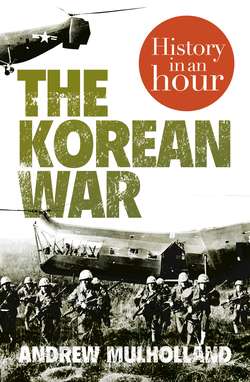The Korean War: History in an Hour

Реклама. ООО «ЛитРес», ИНН: 7719571260.
Оглавление
Andrew Mulholland. The Korean War: History in an Hour
THE KOREAN WAR. History in an Hour. Andrew Mulholland
Contents
Introduction
Background. Geography
Culture
A History of Conflict
After the Second World War: Two Koreas Emerge
The North Invades. June 1950: The Surprise Attack
A United Nations War
The UN Coalition Builds
The United Nations Clings On. Air and Naval Power
July–August 1950: The Situation on the Ground
The Defence of Pusan
UN Counter-Offensive. September 1950: Invasion at Inchon
October 1950: Moving North of the 38th Parallel
China Intervenes. Phase 1: The Initial Chinese Offensive, October–November 1950
Phase 2: The United Nations Is Pushed Back, November–December 1950
Phases 3 and 4: General Ridgway’s Riposte, January and February 1951
The Fall of MacArthur
Phase 5: Chinese Spring Offensive, April–June 1951
Entrenched: Peace Talks and Military Stalemate. Initial Peace Talks, July–August 1951
Talks at Panmunjom – and Further Military Stalemate, October–December 1951
Beginnings of a Peace Deal
Political Change in the USA
Ceasefire: July 1953
Other Developments in the Korean War
The Air War
The Naval War
Irregular Warfare
Propaganda and Intelligence
Changing Attitudes
Casualties of War. The Korean People
Prisoners of War
Korea Since 1953
Reasons to Remember
Appendix 1: Key Players. Edward Almond (12 December 1892–11 June 1979)
Dwight D. Eisenhower (14 October 1890–28 March 1969)
Douglas MacArthur (26 January 1880–5 April 1964)
Kim Il Sung (15 April 1912–8 July 1994)
Mao Zedong (26 December 1893–9 September 1976)
Syngman Rhee (26 March 1875–19 July 1965)
Matthew Ridgway (3 March 1895–26 July 1993)
Harry S. Truman (8 May 1884–26 December 1972)
Appendix 2: Timeline of the Korean War
1950
1951
1952
1953
Appendix 3: The 1950 UN Coalition
Appendix 4: Military Organization
Got Another Hour?
Отрывок из книги
Title Page
The North Invades
.....
About the Publisher
Despite the obvious weakness of the American position, the Russians accepted the 38th Parallel proposal at the Potsdam conference. Their chief focus was on Europe and they may have imagined that in due course, the whole of Korea would fall to them.
.....